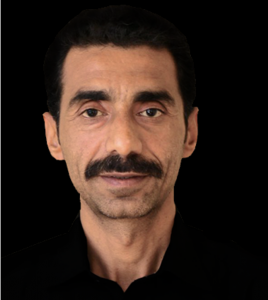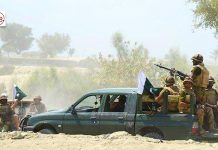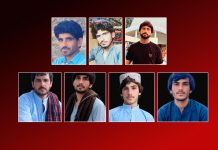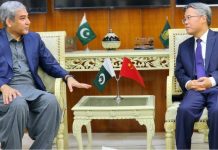TBP Feature Report
Author: Behzad Deedag Baloch
25th January of 2014 was a very cold day, in this coldness, a shepherd hailing from Tootak town of Khuzdar district headed to a locality named ‘Muzha’, which was previously a no-go-area. He was the first unauthorised person to be there in the last three years. But who were the authorised persons to be there? Why was the locality a no-go-area?
The answer lies in the past, on 18th February of 2011, Tootak town witnessed a major military operation, half the town was turned into ashes, two youngsters were killed and more than two dozen people were taken away in military trucks. None of those two dozen people have been seen again, except for one, as his dead body was found hundreds of miles away from where he was taken away.
When the military left, they left a group of armed men behind, dressed in shalwar kameez, long-bearded and armed to teeth. These were the people who had turned the locality as a no-go-area, they identified themselves as the militiamen of Shafiq Ur Rehman Mengal and were proud of their Jihad expeditions in Kashmir and Afghanistan; now they were in Balochistan, to cleanse it of “Infidels” the pro-independence political workers and members of Baloch armed groups. The bearded men apparently had clean-shaved handlers. They remained in the area for three years and only left a week before the shepherd found himself in the area where they were camped. What happened next?
On 27 January 2015, Asian Human Rights Commission released an emergency press release which read: “On January 25, three mass graves were found after one of them was discovered by a shepherd who saw pieces of human bodies and bones. He informed the Levies, a private armed force organised by tribal leaders.”
“The Asian Human Rights Commission (AHRC) expresses shock and deep concern over the discovery of mass graves in Balochistan; it is suspected that these graves are of Baloch missing persons who were arrested and subsequently extrajudicially killed. A large number of family members gathered around the places of Tootak village, district Khuzdar to inquire about their loved ones who have been missing for many years. However, the police and other security forces refused them permission to try and identify the bodies and baton-charged the people to disperse them.”
“As the news of the mass grave spread throughout the district people gathered there and started digging in the nearby area where they found two more mass graves. In total 103 bodies were recovered from the graves. The bodies were too decomposed to be identified. From the three mass graves 17, 8 and 78 bodies were found but the local people say that a total of 169 bodies have been found. People have witnessed more than 100 human bodies in Tootak while they were digging the area. However, Pakistani military forces stopped the local people from unearthing the mass graves and took control of the area. Now, no one is allowed access to the location except military personnel,” further read the press release.
The Tootak mass-graves were not the only ones emerged in Balochistan. The infamous so-called ‘Kill and dump policy’ of Pakistan military against Baloch political workers and leaders was behind the surfacing of other mass-graves across Balochistan. In November 2010, 5 dead bodies of missing persons were found in a grave in Bostan area of Pishin district. Similarly, on 11th May 2011, dead bodies of three Baloch leaders—Agha Abid Shah, Master Sattar and Safeer Baloch— in Panjgur district.
Asian human rights commission was not the only international platform back in 2014 where the mass graves were discussed and condemned, Louie Gohmert, an American congressman also raised the issue in US Congress to put pressure on the Pakistani government. As a result, Dr Malik Baloch who was the Chief Minister of Balochistan then named Shafiq Ur Rehman as the culprit behind the Tootak mass-graves and ordered to set up a judicial commission under the supervision of Justice Noor Muhammad MiskanZai.
The commission collected 57 accounts of eye-witnesses out of which 38 testified the involvement of Pakistan army, its secret agencies and the militia run by Shafiq ur Rehman Mengal. Although it was an act of bravery by the witnesses to record their statement against the powerful military but their statements were outrightly rejected by the commission and in the final report there was no mention of even Shafiq Mengal. The sole reason for the rejection of their statement was that they could not prove the involvement of the Pakistan army.
The inadequate pressure from the world gave a clean chit to the powerful military of Pakistan to continue arbitrary arrests and its kill and dump policy in Balochistan. According to the NGO ‘Voice for Baloch Missing Persons’ which collects the data of missing persons and also campaigns for their release, the count of 18 thousand missing persons of Balochistan in 2014 surged after that year to 44 thousand until 2019.
To find the answer of why the world has kept silence on war-crimes of Pakistan, The Balochistan Post contacted Dr Naseem Baloch who is the Organizer of Diaspora Committee for Baloch National Movement( a Baloch nationalist party) and is living in France. He said, “ The world is not taking action against Pakistan’s war-crimes because Pakistani state works as a private firm for them and can be hired whenever a world power needs it. The other factor is that Pakistan has groomed religious extremism and often blackmails world powers to unleash these extremists if they force Pakistan to stop its inhuman practices in Balochistan or elsewhere.”
“I also blame Baloch diaspora and Baloch leaders living in West who have failed to make friends for Baloch nation in last two decades, and we do not have proper documents where all Pakistani crimes could have been recorded, we have failed to access international platforms, who else can we blame for our situation except us?” he questioned.
The echo of mass-graves in Balochistan has been heard again after 6 years, this time in British parliament when Mr Nigel Adams, Minister of State at the Foreign and Commonwealth Office and the Department for International Development in the UK, replied to a question raised by Mr Stephen Morgan, who is the Labour MP for Portsmouth South, in the parliament. Mr Adam said that they are aware of reports of mass graves in Khuzdar, Turbat and Dera Bugti in Balochistan.
Stephen Morgan asked Nigel Adams what steps the Government is taking to ensure that UK arms exports are not used in human rights violations in Balochistan to which Nigel Adams replied that the UK Govt does not issue export licences where we assess there is a clear risk that the items might be used for internal repression. The Government keeps defence exports under careful and continual review and can suspend or revoke licences when necessary.
Stephen Morgan further questioned that what assessment Nigel Adams has made of the accuracy of allegations that British made arms have been used in human rights abuses in Balochistan. Replying to the question, Nigel Adams said that All export licences are strictly assessed on a case-by-case basis against the Consolidated EU and National Arms Export Licensing Criteria. Risks around human rights abuses are a key part of our assessment.
The Labour MP raised the questions in parliament after a delegation headed by Hakeem Wadhela, the president of Baloch National Movement UK Chapter, met twice with the MP and gave a detailed presentation about Balochistan.
Francesca Marino is an Italian journalist and an expert on South Asian affairs, she is the author of book ‘Apocalypse Pakistan’. The Balochistan Post asked for her comments on the recent confirmation of UK government of being aware of the presence of mass graves in Balochistan, she said, “I find it astonishing but I’m not surprised. We all know arms and helicopters sold to Pakistan have been used against Baloch and against other Pakistani citizens. I don’t know so well the UK legislation but I know in details the legislation of my country, Italy. We go on selling weapons to Pakistan even though Italian Law 185 of 9 July 1990 prohibits, in fact, the export and transit of weapons materials to countries in conflict unless they have been attacked by other countries (as established by Article 51 of the Charter of the United Nations), to countries whose policy contrasts with the principles of Article 11 of the Italian Constitution (Italy rejects war as a mean of a solution of conflicts) and countries whose governments are responsible for serious violations of international conventions on human rights, ascertained by UN, EU or Council of Europe.”

She further said, “Last year we sold weapons to Pakistan for 682 million euro. As I just wrote today, acknowledging UK knows of the mass graves, the West knows, UN knows and the world not only do nothing about it but goes on selling arms to Pakistan, the same arms used against Baloch and other Pakistani citizens, means we are not just witnesses but also responsible for those unnamed bodies, for the plight of people of Baloch waiting for years their dear ones to come back. We are responsible for those graves, for those children. And partners in crime with Pakistan.”
Khalil Baloch is the chairman of Baloch National Movement(BMN), we asked him what are the responsibilities of Britain after they revealed that they are aware of what’s happening in Balochistan? He said, “I consider the confirmation of British government that they are aware of mass-graves in Balochistan a win for Baloch political voice, this revelation did not come overnight but Baloch political workers worked hard for the awareness, documentation and putting the records in front of the world and today we received the fruit of that hard work.

“Although it is a welcome step but it is not enough knowing the role of Britain among the leaders of the world. Britain always had historical responsibilities in this region as it was Britain who created Pakistan and played a role when Pakistan occupied Balochistan, now is the time they correct their past mistakes,” Khalil Baloch added.
This year on 11th March, American state department released its annual report on human rights practices on countries which are allies to America or UN members, the report extensively reported human rights violations in Balochistan and for the first time Baloch Missing Persons were accepted as ‘Political Prisoners’, the report also mentioned the excessive use of military might in Balochistan.
Two world powers have talked about the rights violations in Balochistan within a week, which are welcomed by Baloch people, but would this change circumstances in Balochistan? After the voices raised for Balochistan in the world, what are the main news coming from the region? “Baloch Missing Persons’ campaign entered in its 3923rd day”, “Military operation in Washuk and Mashkay districts of Balochistan”, “Families of missing persons protest in Lyari”, would there be any change?































